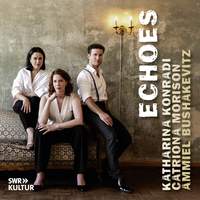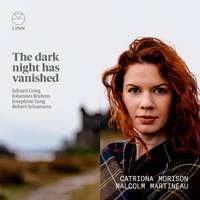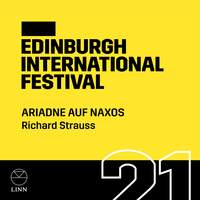Interview,
Catriona Morison on Mahler, music education and mental health in the music industry

Seven years after being crowned Cardiff Singer of the World, Scottish mezzo-soprano Catriona Morison returns to her home city tonight to perform Mahler's Lieder eines fahrenden Gesellen at the Edinburgh Festival with the Bamberger Symphoniker and Jakub Hrůša.
In the lead-up to the concert, we spoke about the Edinburgh choir (and its inspirational leader) which lit a fire in her at a young age, breaking down psychological barriers around music education, how she navigated the 'overwhelming' impact of her Cardiff victory on a personal and professional level - and joining forces with Katharina Konradi and Ammiel Bushakevitz for a new album of duets by composers including Mel Bonis, Pauline Viardot-Garcia and Robert Schumann.
(Homepage photograph of Catriona Morison by Andrew Low.)
What sort of musical opportunities did you have as a young child?
I was incredibly lucky, because music was always happening in my house. My mum was a music teacher and my dad taught languages - an amazing combination for an aspiring singer! And we also had access to music outside the home from a very young age - including percussion workshops which were essentially a weekly class where kids could go along and bang a stick on something. Having the opportunity to make noise in a class situation is such an important thing for young children, because obviously not every parent will want that at home 24/7!
Once my sister and I were a bit older we joined a group called The Waverley Singers in Edinburgh, which was run by an incredible woman called Pam Duncan. These groups really need someone to be at the helm and steer everything, and Pam was that person for The Waverley Singers: it gave me a much broader introduction to making music in a group, and the social side was so important as well. Around this time I was allowed to choose a musical instrument, and I chose the violin because mum played the violin too; later I also picked up the viola. My grandparents were also very involved, contributing to the financial side of lessons and taking me to concerts.
It was a wonderful, wholesome environment in which to grow up, and I honestly didn’t know any different. I find myself using the word ‘gift’ a lot, but music is a gift for a young child, not just because it helps maths and other subjects – it’s important for our souls, and for learning how to communicate in what’s essentially another language.
What single thing do you think we should prioritise to improve access to music education in the UK today?
Obviously there’s the question of having the financial means to fund lessons and concert-tickets, and if I had the answer to that one I’d be shouting it from the roof-tops…But psychologically, it’s a vicious cycle; kids have to be introduced to music at a young age, so parents have to want to introduce them to it and support them through the discipline of practising every day. If the adults aren’t on board, it’s maybe because they didn’t experience music education and haven’t really thought about the value of it.
When people think ‘Oh, classical concerts aren’t for me’, what’s behind that? There’s a lingering perception that these events are very expensive, but you can pick up tickets for ten pounds (or Euros): there’s another barrier there that has to be broken down. I was talking about this to my sister, who’s a health psychologist, and she was saying we need psychologists to work with big arts organisations and develop strategies for understanding those obstacles and getting past them.
Speaking of obstacles, were economics a factor in your decision to base yourself in Germany at the beginning of your career?
I moved to Germany after I graduated. There was so much available at the Royal Conservatoire of Scotland, but I knew that with only one opera company in the whole of Scotland it would be very difficult to sustain a career. I’d done an Erasmus scheme to Berlin when I was 21 and it really opened my eyes to what was available. London is its own little world and I didn’t have that many contacts there, so I thought ‘Let’s go to Germany and see what happens’. This was pre-Brexit, so it was very straightforward: I just booked a flight, found a flat and got on with it!
The goal was always to move back to Berlin eventually, but I knew if I did that straight away I would never learn German because everyone speaks English! So I based myself in Cologne, which is such a great hub: if an audition came up in a different country it was usually just a train-ride away.
My immediate goal was simply to pay my bills as a singer without having to get another job; I was always looking out for solo opportunities through auditioning for competitions and agents, but there were plenty of ways to earn money alongside that. I did lots of choral and ensemble work, including a season with the Bayreuth Festival Chorus, then during my second summer I went to the Young Singers Programme at the Salzburg Festival.
Next I found my way to the opera studio in Weimar, which gave me so much more real working experience than I think I’d have got on a similar programme at one of the ‘A-list’ houses. After that, I auditioned successfully for a Fest contract in Wuppertal, and that felt like a huge milestone. The Fest system over here is an amazing thing, and was a big factor in my decision to move to Germany. It gives you a level of financial security that’s unimaginable for a freelance singer in the UK: the closest equivalent is the BBC Singers or the Royal Opera House chorus.
There’s so much talent in the UK, but so few opportunities to make a full-time living from performance. That’s very frustrating to look in on from afar: I don’t have all the answers, but it would be wonderful if our government could adopt just some of the elements from the German system to make things easier for musicians in the UK.
Where did your victory at Cardiff Singer of the World fit into the story?
I was still over the moon about landing my Fest job when my world was turned upside-down (in the best possible way!) by Cardiff. Up until that point my career progression had been very natural – Cardiff was overwhelming in many ways, because it thrust me forward when I wasn’t really expecting it. Obviously when you enter a competition you’re putting yourself out there, but I don’t think I’d ever thought about actually winning: I was happy with how my career was going, and it just seemed like a good opportunity to get more exposure.
For a while I tried to juggle my job in Wuppertal with all the freelance requests that were coming in, but eventually I spoke to the theatre and came to an agreement that I would step out of my contract early but still be connected to the house: I’m forever grateful to them, because it gave me a transition period. And of course I’m forever grateful to Cardiff for that platform, because it accelerated my career forward a couple of steps: winning the competition meant that I was able to freelance, then after a year I moved to Berlin.
From a personal point of view, how did you manage that potentially overwhelming situation?
The Cardiff final is probably the one time I was so nervous beforehand that I couldn’t see straight, but somehow when I went on stage the nerves just dropped away. Adrenaline can be an amazing thing. If you’ve done everything you can to set yourself up for success beforehand, then you have to accept that when you go on stage you’re only human - that’s what live music is all about.
I can’t say that I’ve ever dealt with crippling anxiety, but I’ve used Emotional Freedom Technique (or ‘tapping’) to deal with nerves: my dad is a qualified EFT therapist, so I learned a lot from him. It’s all about the acupressure points on the upper body which are connected to the meridian lines, and those meridian lines have been proved by ink dye tests so there’s real scientific basis for it: it’s all grounded in the nervous system.

Non-operatic duet recitals from singers are relatively rare on record! What are the challenges and rewards of a project like this?
Let’s start with the rewards: it’s amazing music, and so much fun to sing! In any song recital the singer and pianist are constantly bouncing off one another’s energy, but having another singer elevates that even more. Our pianist Ammiel said that in a way it’s more difficult for him, because he has to tune in two people’s breathing: I’d never really thought about that! But Katharina and I took care to sync up our own breathing, and worked a lot on placing consonants, matching vowels and making sure our diphthongs happened in the same places.
Katharina and I met maybe fourteen years ago, through a teacher I’d studied with during my Erasmus year in Berlin; a few years later we both ended up being New Generation Artists for the BBC, which is when we first had the idea for this programme. We have completely different voices and repertoire, but figuring out how to come together to create a homogenous sound whilst still being true to our individual voices was great fun. That sort of thing comes quite naturally to me because of my choral training: any time I sing with another singer I’m constantly listening to them, whether it’s in recital or opera. As singers we’re hardly ever on stage entirely alone.
It’s lovely to see those duets by Mel Bonis, Pauline Viardot and Maria Malibran on the album…
I love to present music by female composers who’ve either been forgotten about or who are completely unknown, if the music is of quality: I wouldn’t want to throw in any old female composer just for the sake of it! And that Mel Bonis duet really is of quality: if you listened to it alongside one of the (male) giants of the Romantic period you wouldn’t be able to tell which was which. I was sent it by a fascinating and intelligent lady called Florence Launay, whose husband was the Studienleiter when I worked in Wuppertal: she’s done a lot of research into French female composers, and also coached our French for the recording!
You’re back on home turf this week to sing Mahler’s Lieder eines fahrenden Gesellen at the Edinburgh Festival: what’s special about the cycle (and about Mahler’s music more generally) for you?
I love singing Mahler: there’s so much depth to the texts that he chose to set, and from a mezzo point of view it just feels glorious. Lieder eines fahrenden Gesellen is quite a challenge from a technical point of view, because there’s quite a lot of high floaty writing as well as some low dramatic passages, and from a psychological standpoint the highs and lows are so complex…It’s basically all about a mental health crisis: the cycle opens with this person hearing the wedding-march of his past love, and the four songs are about his attempts to process that loss.
In the second song we see him trying to put on a happy face and be distracted by nature; in the third we see him experience violent anger and be completely consumed by depression, then the final song depicts this trance-like, dissociative state where he’s completely disconnected from his body and reality…There’s so much to discover in these songs, and I always find something new every time I perform them.
A few years ago I had an extraordinary experience when I jumped in to sing Mahler 3 with Semyon Bychkov and the Czech Philharmonic in Prague. This was a few days after a shooting had taken place directly across from the Rudolfinum where we were performing, and the orchestra had invited some of the students, family and faculty-members as an opportunity to help them heal or process what had happened.
As I sat there in the middle of the orchestra after I’d sung, there was this overwhelming surge of emotion in the music. It didn’t wash over me - it went through me, and I had to fight back tears because it was so powerful. It reminded me how important live music can be, because it means something has shifted in you: even if it’s just for a couple of minutes, you feel something deep and it does you good.
Why do we go to concerts? I think it’s because we want to be moved, and to experience something that we don’t experience in day-to-day life. Our civilised society has taught us to shove any dark emotions into a box and not talk about them: perhaps that’s started to change because mental health is being discussed more openly, and music absolutely has a role to play in that process. When people come up to me after a concert and tell me that they were moved to tears, it touches me so much, and in Prague I experienced that first-hand in a way that’s difficult to put into words.
Katharina Konradi (soprano), Catriona Morison (mezzo), Ammiel Bushakevitz (piano)
Available Formats: CD, MP3, FLAC/ALAC/WAV, Hi-Res FLAC/ALAC/WAV
Catriona Morison (mezzo), Malcolm Martineau (piano)
Available Formats: CD, MP3, FLAC/ALAC/WAV, Hi-Res FLAC/ALAC/WAV
Dorothea Röschmann (Ariadne), David Butt Philip (Bacchus), Catriona Morison (Composer), Brenda Rae (Zerbinetta), Thomas Quasthoff (Major-Domo)
Royal Scottish National Orchestra, Lothar Koenigs
Available Formats: MP3, FLAC/ALAC/WAV, Hi-Res FLAC/ALAC/WAV





